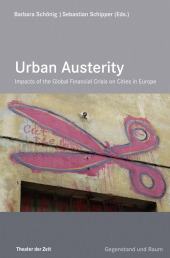 Neuerscheinungen 2016Stand: 2020-02-01 |
Schnellsuche
ISBN/Stichwort/Autor
|
Herderstraße 10
10625 Berlin
Tel.: 030 315 714 16
Fax 030 315 714 14
info@buchspektrum.de |

Sebastian Schipper, Barbara Schönig
(Beteiligte)
Urban Austerity
Impacts of the Global Financial Crisis on Cities in Europe
Herausgegeben von Schönig, Barbara; Schipper, Sebastian
2016. 296 S. 22 cm
Verlag/Jahr: VERLAG THEATER DER ZEIT 2016
ISBN: 3-9574908-3-9 (3957490839)
Neue ISBN: 978-3-9574908-3-4 (9783957490834)
Preis und Lieferzeit: Bitte klicken
Benannt ist mit dem Begriff der Austerität die insbesondere in Europa seit 2010 dominante Strategie zur Bewältigung kapitalistischer Finanzkrisen durch die Senkung öffentlicher Ausgaben. Während sich die Berichterstattung jedoch meist mit den nationalen Politiken beschäftigt, sind es vor allem Städte, in denen die Auswirkungen von Austerität besonders spürbar werden. Hier sind jene öffentlichen Infrastrukturen konzentriert, die von Kürzungen betroffen sind. Hier lebt die Mehrheit der ärmeren, auf Sozialleistungen angewiesenen Bevölkerungsschichten. Und hier zeigen sich soziale Polarisierungstendenzen am unmittelbarsten.
In europaweit vergleichender Perspektive werden in achtzehn Beiträgen die räumlichen Differenzen, Ungleichzeitigkeiten und Widersprüche beleuchtet, von denen die gegenwärtigen Kämpfe um die Durchsetzung von Austerität geprägt sind.
´In the period since the Wall Street crash, the refurbished rationale for austerity measures is that the imposition of strict fiscal discipline and government spending cuts is the (only) way to restore budgetary integrity - thereby securing the confidence of the investor class, appeasing the jittery markets and paving the way to growth. The critical test case that is Europe, of course, shows no signs of working. (Peck, 2012: 626)
1. Introduction
Since 2010, the global financial and economic crisis - which began, in 2008, as a result of the mortgage crisis of 2007 - has transformed into a sovereign debt crisis (Altvater, 2011; Blyth, 2013; Whitfield, 2014). Throughout each of these interconnected phases, cities have been at the center of the turmoil (Gotham, 2009; Hadjimichalis, 2011; Harvey, 2011; Martin, 2011; Blazek & Netrdova, 2012; Donald et al., 2014; Tabb, 2014; Eckardt & Sanchez, 2015). The economic crisis and the "fiscal dictatorship" (Lehndorff, 2012: 8ff) imposed by German and European elites in the years that followed (Bieling, 2011; Hadjimichalis, 2011; Demirovic & Sablowski, 2012) have dramatically affected urban regions: indebted homeowners have been evicted, masses impoverished, public budgets squeezed, municipal infrastructures privatized, public services downsized, and, above all, austerity measures implemented.
In December 2014, more than 80 urban scholars, politicians and social movement activists from ten different countries came together at the Institute for European Urban Studies (IfEU) at Bauhaus-Universität Weimar to share their research on the impacts of the global financial crisis on European cities as well as the experiences these cities have made with urban austerity policies. As a result, the conference has placed an issue that affects most people living in urban regions across Europe into the center of attention: the idea that fiscal austerity is an unavoidable political necessity in spite of its harsh consequences. The seemingly unavoidable hegemonic paradigm driving European politics is the idea that public budgets must be balanced and that this can only be achieved by way of frugal policies and an even leaner state than that which already exists: whether school buildings or bridges are nearly in ruins, public housing, waste management and/or health care are being privatized and reorganized according to profitability, participation in planning processes is being sacrificed on the altar of inter-urban competition, or the masses proclaim their resistance.
The impact of this strategy is felt most in urban regions. It is in the cities, as Jamie Peck (2012: 629) puts it, "where austerity bites." The immense effects of austerity are most obvious in cities, which are sites of collective consumption dependent on public infrastructures, such as schools, social housing, hospitals, and public transportation. Increasing social polarization can immediately be observed where most of the poor and working class people live (Tonkiss, 2013; Donald et al., 2014; Meegan et al., 2014; Peck, 2014; Vaiou, 2014): "Austerity is especially [urbanized] with cities predominantly on the receiving end of fiscal retrenchment because they remain disproportionately reliant on public services and public employment with large municipal bureaucracies and [organized] workforces with pay and pensions that are targets for reform. They also house the [marginalized] individuals and groups that are the target of austerity-driven welfare reform [programs]" (Meegan et al., 2014: 141).
None of this is new: neither budget deficits nor the hegemonic idea that austerity is an appropriate reaction originated in the financial crisis of 2007-08 (Blyth, 2013; Tabb, 2014; Whitfield, 2014; see also Patti & Polyak, Chapter 9 in this book): "Austerity measures, selectively applied, have long been part of the neoliberal repertoire. Fiscal purges of


